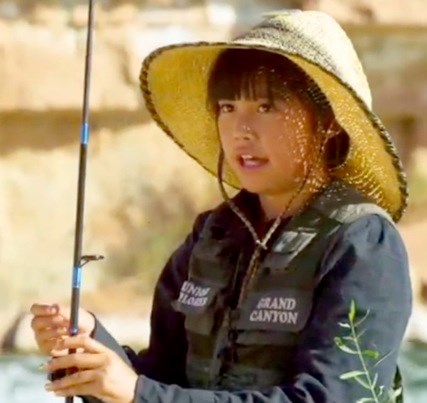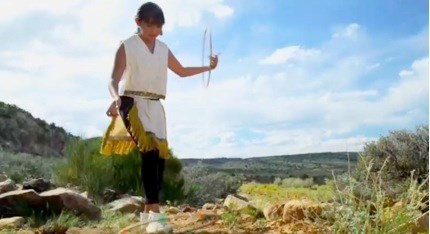 |
Jaime Lynn Butler is close with her grandfather. She performs their native Navajo hoop dance while he plays music. She listens, as he passes knowledge and history down through the generations, using the tradition of oral storytelling. He tells her of days past, of a time when travelers could walk across the desert by going from spring to spring and explains that, because of climate changes, those springs are drying up. It's a story that, to the 11-year-old Navajo artist, is all too familiar. Jaime, perhaps more than most of us, understands what it means to lack for water. Her family lives in the dry desert town of Cameron, Arizona, on the Navajo Reservation. Their home has no running water. To find drinking water for themselves and the goats and sheep that sustain them, they travel to a distant spring and bring water home in 50-gallon drums. "It's hard to live without water because it's the desert and it gets pretty hot here in the summer."
Each day, she passes the empty corral on her family's property, a corral that once housed her horse William. It's a painful reminder of the state of the areas water resources. "I kind of felt sad when we had to sell my horse William," she said. "We couldn't take care of him because hauling water was too much. This is the desert and it's hot and he could possibly get dehydrated if we didn't have any water." With a great attitude, Jaime takes it in stride, as much as you can expect for an 11-year-old. She is eager for knowledge as she learns the science behind the water shortage.
 |
"My mom taught me about global warming," said Jaime. "She told me that, when it's too hot, the water dries up and then there's nothing. There's no water." She also learned about the doctrine of public trust, which states that the government owns the land under navigable waters and holds it in trust for the benefit of the public. The doctrine states that any sale or use of that land underwater must be in the public interest.
Jaime struggled to reconcile the words of that doctrine with issues like offshore oil drilling and practices she saw as having a negative impact on the planet. She decided to ask the government to stay true to the doctrine of public trust. "I wrote to President Obama," she said. "My first letter was about the Arctic Refuge. I kept writing to him and I drew pictures and told him it was for the oil spill. After the sixth letter, President Obama wrote back to me." In his letter, President Obama told her, "Your generation will play an important role in meeting the challenges of the 21st century and I urge you to stay involved. You can accomplish great things and help others to do the same."
Jaime says she will continue to do her part to help preserve the world's natural resources for herself, as well as for others. "I want to help the environment and help animals," she said, adding that she hopes the world will still have water and animals for the future children. Jaime's story is told in the documentary, The Public Trust, which can be viewed on the MY HERO web site, Stories of Trust - Arizona.
Page created on 8/6/2014 6:33:13 PM
Last edited 1/5/2017 9:31:11 PM
